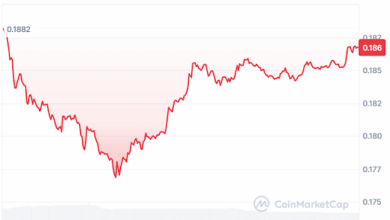Crypto Founder Ordered to Pay $228 Million over Fake AI Ponzi Scheme
EminiFX founder Eddy Alexandre just lost a court battle over his fake AI exchange scam and must pay $228 million to his creditors. This represents the climax of a two-year legal battle. Several of EminiFX’s tactics are still notorious in 2025. He used fake promises of AI to lure investors, targeting NYC’s immigrant populations. Both … <a href="https://beincrypto.com/eminifx-scam-fake-ai-ponzi-scheme-guilty/">Continued</a>
EminiFX founder Eddy Alexandre just lost a court battle over his fake AI exchange scam and must pay $228 million to his creditors. This represents the climax of a two-year legal battle.
Several of EminiFX’s tactics are still notorious in 2025. He used fake promises of AI to lure investors, targeting NYC’s immigrant populations. Both these methods are in use today.
EminiFX’s Fake AI Scam
Crypto crime may be at an epidemic level right now, but major frauds from the past also tend to pop back up.
Two years ago, EminiFX founder Eddy Alexandre was sentenced to prison for commodities fraud. Today, the CFTC won another victory over EminiFX, ordering Alexandre to pay a massive fine for the scam:
“The CFTC seeks restitution on behalf of EminiFX’s investors in the amount of $228,576,962, which is the amount of money contributed to the company by EminiFX investors minus withdrawals. Simply put, EminiFX was a Ponzi scheme, and investors’ decisions to give their money to Defendants were predicated entirely on fraudulent misrepresentations,” the court order read.
EminiFX was ostensibly a CEX and forex business, but its real scam proved somewhat ahead of its time. Alexandre claimed that the platform used a sophisticated AI protocol to double investor yields.
In reality, the business was a Ponzi scheme, using future investments to keep early adopters on the hook.
A Scheme Ahead of Its Time
Several of EminiFX’s scam tactics are much more common now. In 2025, AI-powered tools are enabling many scams, with AI-generated code used to drain wallets and sophisticated deepfakes facilitating social engineering.
Alexandre used the promise of AI as a confidence scam, but the technology wasn’t a core component. Apparently, he didn’t use AI at all, spending investor money on personal bills and risky trades that lost $49 million.
Additionally, EminiFX specifically targeted Haitian-Americans in New York City to invest in the scam. Today, NYC’s immigrant populations are a frequent target of organized scammers, who run social media campaigns to attract low-information victims.
These tactics may be common in the scam world now, but EminiFX is finished. The US government has a diminished capacity to pursue crypto criminals, but the CFTC can still score big wins.
In addition to his ongoing prison sentence, Alexandre will have to refund $248 million of investor money. He’s also been ordered to pay $15 million in fines, but his reimbursements will count towards this total. Apparently, this latter fine is insurance; he’ll be criminally liable if he can’t pay this penalty.
There’s an ongoing battle against a new generation of crypto criminals, but justice was done in this instance.
Disclaimer: The content of this article solely reflects the author's opinion and does not represent the platform in any capacity. This article is not intended to serve as a reference for making investment decisions.
You may also like
Hong Kong’s HKMA Launches Fintech 2030 to Drive Future Financial Innovation

Balancer DeFi Hack: $70.9M in Crypto Stolen
DeFi protocol Balancer suffers a major exploit with $70.9M in crypto drained. Team yet to respond.Funds Moved to New WalletWhat’s Next for Balancer and DeFi Security?

Dogecoin Price Prediction Targets November Surge, While BullZilla Steals the Spotlight Among Best Meme Coin Presales in 2025
BullZilla and Dogecoin battle for investor attention among the best meme coin presales in 2025 as BullZilla’s presale explodes and Dogecoin eyes a recovery from recent declines.Dogecoin Price Prediction: A Chance for a Strong ComebackBullZilla: Exploding Ahead in the Best Meme Coin Presales in 2025Conclusion

Bitcoin Dips as Whale Sales Trigger $414M in Liquidations
Crypto markets dip as whales sell $2B in BTC, leading to $414M in liquidations amid rising geopolitical risks.Liquidations Top $414M as Sentiment Turns FearfulMarket Cap Falls Amid Uncertainty

